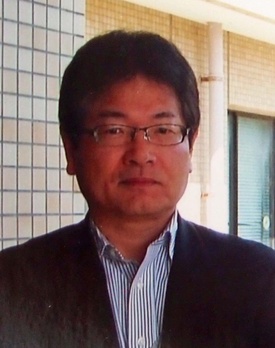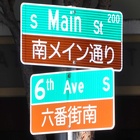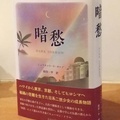Juliet Kono's novel "Darkness" depicts a Hawaii-born second-generation Japanese-American woman surviving a life of hardship during and after the war. Ippei Maeda, a scholar of American literature, translated the novel over the course of 10 years and published it at the end of last year. We asked him about the appeal of the novel and Japanese-American literature.
* * * * *
The story of the heroine's "awakening"
What first inspired you to translate Anshu: Dark Sorrow?
Maeda: The original work was published in 2010, and I first encountered the book the following March. At the time, I was translating the novel that would become known as "That Day at the Panama Hotel," and was in Seattle, the setting of the novel, for about a week to conduct final research. Almost every night, I was treated to dinner at the home of my research mentor, Professor Steven H. Sumida of the University of Washington. At dinner the day before I returned to Japan, Professor Sumida and his wife, Professor Gail Nomura, introduced me to "Dark Lost," saying, "If you're going to translate a novel, why don't you try translating this book?"
In addition to being interested in the outline of the story, I was also drawn to the fact that the author was Juliet S. Kono, whom I knew personally. Five or six years before, when I was a visiting scholar at the University of Washington, I had the opportunity to audit Professor Sumida's class "Hawaiian Literature." One day, a poet named Juliet S. Kono came from Hawaii to the class and spoke about her collection of poems. After the class, I received a phone call, either from Professor Sumida or from Professor Nomura, who said, "I'm having lunch with Juliet, so you should come too," and we had lunch together.
After returning to Japan, I read the original novel and decided to translate it. Not only was the story interesting, but its focus was tied to the atomic bombing of Hiroshima. I was educated and got a job in Hiroshima. Every day, when I saw a train, crossed a bridge, or looked down at a river, I would have visions of the atomic bombing. But I never got involved in anti-nuclear or world peace activities. I had been dragging this around with me like a guilty feeling, so I thought that translating Anshu might help ease that feeling, even just a little.
--I heard it took about 10 years from translation to publication. Can you tell us about the process that led to this project?
Maeda: Not only is it a lengthy translation of over 460 pages, but the details and specifics of wartime and postwar Japan, especially the Tokyo air raids and the Hiroshima bombing, were time-consuming and difficult research subjects for me, who was born after the war. The same was true of the Buddhism that guides the heroine to growth. The author himself says that it took him 10 years to research and write the book.
This means that the translator must make the same effort as the author, or even more so. Although Juliet S. Kono is of Japanese descent, she is a third-generation American. Therefore, I carefully examined, with all due respect, whether the author had any misunderstandings about Japan in relation to the Pacific War, or any conscious or unconscious prejudices or preconceptions about Japan's past from an American perspective. After the bombing, several research teams and medical teams were sent from the United States to Hiroshima, and I took particular care in the way I portrayed them in this novel so as not to raise any doubts or offenses among Japanese readers, especially those in Hiroshima.
At the end of the story, the heroine is examined at a medical facility in the United States. She unashamedly entrusts her entire body, which has been exposed to radiation, to the examiners. At first glance, this medical facility appears to be portrayed in a positive light, but judging from the timing and the fact that the facility is dedicated to examining atomic bomb survivors, it is clear that it is the ABCC (Atomic Bomb Casualty Commission). It has been criticized that the survivors visited ABCC expecting to receive treatment, but in fact they only examined the radiation without providing any treatment. In order to avoid offending Japanese readers on this point, I wrote in the "Translator's Afterword" that this novel and the heroine live in a dimension that transcends the politics of reality. Because I was so sensitive about this point of view, it took longer than expected to translate it properly. Even so, it may not be sufficient.
It is also true that it took a long time to find a publisher. It seems that translated "pure literature" is the genre that sells the least. Moreover, publishers may be hesitant to read a novel that depicts the atomic bombing. Editors from several major publishing companies showed strong interest. In the end, Akebi Shobo took on the project. I asked Akebi Shobo because I was encouraged by their publication of A Town Called the Atomic Bomb Slum. This book, which is based on actual research, is an important publication related to the atomic bombing of Hiroshima.
It took me a while to find Akebi Shobo. For someone like me who is neither a professional writer nor a professional translator, the barrier to entry for publishers is high and extremely high.
--The author is a Jodo Shinshu monk, and the world of "Anshu" seems to have some connection to Buddhism. What are your thoughts on this point as the translator?
Maeda: The author says that he depicts the heroine's growth through the teachings of Buddhism. After going through personal misfortune and disaster, the heroine reaches a kind of awakening. The author calls it "enlightenment," but because the experience is so dramatic, I think it's difficult to discuss the content of the heroine's awakening, which is prompted so quickly to grow. However, there's no doubt that the heroine is conscious of transcending ego, vanity, and desire. This is something she learned from a Jodo Shinshu monk in Kyoto.
Hiroshima has long been the center of Jodo Shinshu faith, and its followers are known as Akimonto. Considering that the author's family was Jodo Shinshu, that he himself is a priest, and that his maternal grandparents (first generation) were from Hiroshima, the heroine's Buddhist growth feels autobiographical. Unfortunately, however, I have not studied the story enough to be able to discuss the heroine's growth in the context of Jodo Shinshu. Even so, I have tried to understand the sutras and Buddhist teachings depicted in the novel in my own way.
--How each reader interprets the theme of the work is, of course, up to each individual reader, but what message did the author want to convey through the protagonist Himiko's difficult life?
Maeda: That's a very legitimate question, but it's also a very difficult one to answer. I think this novel falls into the category of Japanese American literature, but representative or typical Japanese American literature, such as "No-No Boy" that you translated, depicts racial minority consciousness, racial inferiority, internment camps, and assimilation into a white-dominated society. In that respect, "Darkness" is a unique work.
In short, a Hawaiian Japanese-American writer portrays Japan through the eyes of a Hawaiian Japanese-American heroine. Of course, the heroine is a second-generation Japanese-American, so she experiences different racial consciousness and discrimination in Japan than she does in America. After the war, she feels nostalgia for the Americans stationed in Hiroshima and Kyoto and the English they speak. She also works with Americans at GHQ. If I were to write a paper as a researcher, I would interpret this novel from the racial and cultural perspectives mentioned above.
However, while discussing the story in terms of standard terms such as race, culture, and identity may provide some insight, I think we miss the point of the story, because the dimension in which the novel and its heroine live seems to transcend such social and real world dimensions.
I used the word "awakening" earlier. However, to write a paper on what kind of awakening this is, I would have to study Buddhism in depth, especially Jodo Shinshu. I am not capable of doing this. Some may question my ability as a translator.
Speaking of issues in a completely different field, wars and conflicts are occurring in the world today, and many people are being killed. In this reality, I think that what is important is not differences in ideology, religion, race, or historical awareness, but that we must not kill people. In other words, we must protect lives on a level that transcends ideology, religion, race, and historical awareness. Doesn't this underlie the interpretation of "Melancholy" as the heroine's awakening on a level that transcends racial issues and American politics? I even think that this is the raison d'être of literature, which is different from history, sociology, cultural studies, and political science.
--It seems like a difficult task to translate Buddhist ideas written in English back into Japanese. What do you think?
Maeda: The author uses Buddhist scriptures written in English, so when translating it into Japanese, I referred to the Japanese Buddhist scriptures. There are a lot of Buddhism-related websites on the Internet, which was helpful. At first, I translated it into Japanese as I pleased, so when I did the final check of the manuscript, I checked the Japanese Buddhist scriptures to ensure accuracy.
In the process of studying Buddhism, I noticed that events, characters, and fables written in the novel without any explanation were related to Buddhism, so I rewrote them and added annotations. I think you can understand the terms in the annotations by looking them up in a dictionary or on the Internet. It was certainly a difficult task and took 10 years, but I think it was a good thing in terms of ensuring a proper translation.
--I heard that you also verified the historical facts behind the translation. What were the difficulties you faced in translating the book, including these aspects?
Maeda: I was particularly concerned with verifying the American investigative team that came to Hiroshima after the bombing. I knew about the black rain, the victims, the ABCC, and so on, but I knew almost nothing about when and how the American investigative teams came to Hiroshima, and what they did. I also didn't know that the Makurazaki typhoon had hit Hiroshima the month after the bombing. I searched the Internet so much that my eyes were numb, and I made inquiries to the Chugoku Shimbun, Hiroshima City Central Library, Hiroshima Peace Memorial Museum, and other organizations to confirm the accuracy of the information on the Internet. I also struggled with the Hiroshima dialect and the Chikuho dialect of Fukuoka.
Having lived in Hiroshima for many years, I understood the Hiroshima dialect for the most part, but to ensure accuracy, I used an online dialect conversion site to convert the Chikuho dialect as well. However, I was still unsure, so I asked a young acquaintance in Hiroshima to do a final check. I did this because I wanted to minimize the use of old Hiroshima dialect, which may seem strange to young readers. Fortunately, I have a friend who lives in Chikuho, so I asked them to check the Chikuho dialect. Dialects add a color to the translation that is not present in the original text. However, the thing I struggled with the most in the translation, or the thing I was most conscious of, was the rhythm of the Japanese language. I tried to write sentences that were comfortable and calm in Japanese, like reading a haiku with five-seven-five syllables.
--Many Japanese American writers have written works that focus on the relationship between America and Japan, such as war and immigration, but "Anshu" is unique among them, isn't it?
Maeda: Yes. I personally feel that this novel was sent across the Pacific Ocean to Japan, rather than from Hawaii to the American mainland. I also think that "Days of the Sun," written by Jay Rubin, an American who is not of Japanese descent but is known as the translator of Haruki Murakami, is similar. The pattern is that an American author writes an American protagonist and writes in English about Japan as seen by that American.
--I heard you know the author, Mr. Kono. What is your impression of him as a third-generation Japanese-American author?
Maeda: We were not particularly close, and we did not have any personal contact. She was already 80 years old, and she became seriously ill last year. It may not be the best way to put it, but I am really glad that the book was translated and published in Japan while she was still able to recognize it. She was very happy with the Japanese translation.
It seems that her life was not always smooth sailing. She didn't go to the University of Hawaii until she was quite old, and she got married and had a child at an early age, got divorced, and remarried - it seems like a hectic life. There seems to be a fascinating story behind her pen name, Juliet S. Kono. The S stands for "Sanae," and Japanese people often have Japanese names as middle names. However, "Kano" is apparently the name of her ex-husband, whom she divorced. It's interesting.
There are already several researchers in Japan who have written papers about Kono, and he has been invited to Japanese universities, but I have no research interest in him, so I have not met him in Japan.
(Titles omitted)
Continued >>
© 2024 Ryusuke Kawai







